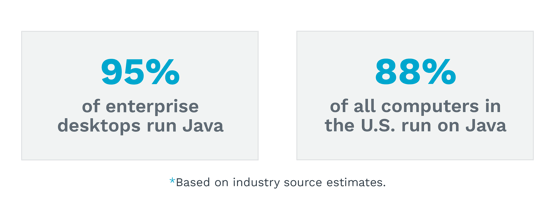Skill 1: Be Able to Run CI/CD Pipelines with Cloud Native Tools
If there is one skill you are looking to master in 2021, it should the ability to implement the continuous integration and continuous deployment of pipelines in the cloud. For companies, this saves them both time and money; making it an extremely desirable skill if mastered.
Understanding AWS, including leveraging various AWS service plug-ins and deploying and building within an AWS environment is a great place to start. While AWS might not have been the first cloud platform, it has dominated the industry since its 2006 launch. In just 15 years, AWS has taken over the market capturing 33.8 percent of the global market share while its closest competitors like Microsoft accounts for 18 percent and Google, Alibaba and Tencent together account for 17% of the market, according to Synergy Research Group.
451 Research suggested in 2018, about 90% of organizations would be on the cloud soon. Due to the recent pandemic, this migration to the cloud has accelerated, forcing companies to rapidly digitize their systems in order to support a remote workforce and keep up with their competitors. More so than ever before, companies seek developers with demonstrated experience in more agile deployment processes.
Skill 2: Gain Exposure to Messaging Services like Kafka for Data Streaming
Long gone are the days of software development acting as an entirely separate function from data science and engineering. In the world we live in today, data, and how it is used, is the bread and butter of an organization. As technologists know, data holds the patterns that when extracted, tell stories and help companies make the most optimized business decisions. A data-informed java developer is extremely appealing to a business, particularly one who is able to identify how data is stored, streamed and transferred.
According to the most senior technical recruiting experts, it is incredibly valuable for Java developers to have exposure to messaging services like Kafka and Rabbitmq, to name a few. Many enterprise-scale applications use these services to "reduce load and delivery times taken by servers", which makes their development processes more efficient and saves time and resources. These messaging services are the "broker" between what information is being gathered and where that information is stored.
Kafka is named after the author Franz Kafka because it is a "system optimized for writing". This skill is still relatively rare - seen more often used by data scientists and data engineers. But in this evolving new world we are living in, java engineers become more marketable and appear more well rounded with familiarity with these messaging tools.
Skill 3: Know the Principals of Complex Distributed Systems
Now that you are familiar with developer skills related to CI/CD pipelines and data, you can begin to think about how all of those skills converge into complex distributed systems. Today, the entire interworking of technical structures and processes is referred to as the software system, encompassing infrastructure, architecture, code, UI, integration, data and more, all working together.
Visualize it as one big box. A complex distributed system is usually for very large-scale systems processing an incredibly large amount of data, and usually includes more than one of these boxes. The UI is on top of this system, and computing power is happening behind the scenes, but it is all in the name of one big product.
One of the most advantageous things you can do as a entry or mid-level java developer is look for roles that have this type of complex environment and gain the practical experience within it. You will find this environment if you work on an enterprise-scale product or for a company developing products for enterprise-level organizations requiring complex systems. Secondly, now that you know what roles you want to go after, research the principals of distributed systems. Look back to when you got your first computer science job and apply the same types of concepts but specifically for distributed systems. Prepare yourself in an interview to speak to these principals.
Skill 4: Be Able to Leverage Java for Containerization and Security
The focus on containerization and security within the technology space is here to stay. You must be familiar with Docker or Kubernetes or a similar tool along with skills like private key encryptions, message digests, digital signature encryption and digital certificates to upskill in this arena.
Docker, for example, is the most widely used form of containerization for applications. Java applications within a container like Docker allows you to build and deploy what is called container images. It is extremely useful to leverage container images as a way to run the same platform across all environments. Plus, when a new platform is released, these containers allow for easier experimentation.
Java is also important for security practitioners because it is the most commonly used programming language. A variety of industry sources estimate that over "95 percent of enterprise desktops run Java, and of all computers in the U.S., 88 percent run on Java." Companies are investing billions to modernize their cybersecurity efforts across all industries and segments. They are looking to their technologists with experience implementing security measures into all projects and new developments.
A Java developer looking to upskill in the security arena should gain experiencing leveraging their programming skills to identify potential security risks and understand how a successful security attack happened in the first place. It is highly appealing to hiring managers for a Java developer to also be proficient in other programming languages so they can be relied on during these security checks and penetration testing. Check out this "Guide to Coding for Cybersecurity".
Skill 5: Be a Curious Engineer
This might not be the hard technical skill you're looking for, but it is important to include when considering what hiring managers really desire in a Java candidate.
Hiring managers are frequently asking candidates to articulate and explain why they used certain tools for recent projects listed on their resume. Additionally, they want to know strategically why the decision was made forgo the use of a another tool or system in the process.
Do your best to develop the skills to understand and explain not just how to do the engineering, but why you're architecting it a certain way and ultimately how it could effect the business. If you can make things more efficient and help the business's bottom line, it can be very beneficial for your entry and growth at a company. You should be able to explain your rationale for every project listed on your resume.

Time to Upskill
Now that you're on the Java developer track, double down and start thinking about your goal and where you want to be. Do you want to architecture and design? Or, do you prefer to code all day? Do you want to get into management? If so, you have to be able to recite your strategies and be paying attention to trends and how things are evolving.
Skill 5 is to be a curious engineer. Meaning, you should develop your 5-10 year plan, and make sure it includes the projection of new trends and needs within the technology space so you can stay ahead.
Developing new skills as a software developer may seem daunting at times, however, the technology industry will continue to evolve so it is essential to stay up to date on the latest trends. Select one skill to focus on, and learn how to master it in 2021. This might just be the year you land your dream job with the company you've always wanted to work for.





